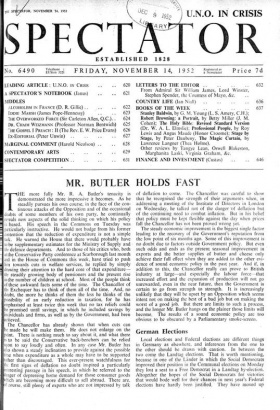MR. BUTLER HOLDS FAST
Is
I.
III
• e promised until savings, in which he included savings by ncividuals and firms, as well as by the Government, had been clieved.
[he Chancellor has already shown that when cuts can • made he will make them. He does not enlarge on the nt. There is nothing much to say about it, and what there s to be said the Conservative back-benchers can be relied Ion to say loudly and often. In any case Mr. Butler has :o shown a steady inclination to provide against the possible inc when expenditure as a whole may have to be supported aher than discouraged. This ever-present watchfulness for c first signs of deflation no doubt inspired a particularly nteresting passage in his speech, in which he referred to the tiger of depressing home demand for those consumer goods hich are becoming more difficult to sell abroad. There are, f course, still plenty of experts who are not impressed by talk of deflation to come. The Chancellor was careful to show that he recognised the strength of their arguments when, in addressing a meeting of the Institute of Directors in London on Wednesday, he talked not of the danger 'of deflation but of the continuing need to combat inflation. But in his belief that policy must be kept flexible against the day when prices fall the Chancellor has not been proved wrong yet.
The steady economic improvement is the biggest single factor leading to the recovery of the Government's reputation from the low point of six months ago. Some of this improvement is no doubt due to factors outside Government policy. But even such odds and ends as the present seasonal improvement in exports and the better supplies of butter and cheese only achieve their full effect when they are added to the other evi- dence of sound economic policy in the past year. And if, in addition to this, the Chancellor really can prove to British industry at large—and especially the labour force—that increased effort and the expansion of production will not go unrewarded, even in the near future, then the Government is certain to go from strength to strength. It is increasingly unlikely that they will be upset by an Opposition which seems intent not on making the best of a bad job but on making the worst of a good job. But there are limits to such a process, and the longer Mr. Butler hangs on the plainer those limits will become. The results of a sound economic policy are too obvious to be obscured by a Parliamentary smoke-screen.


































